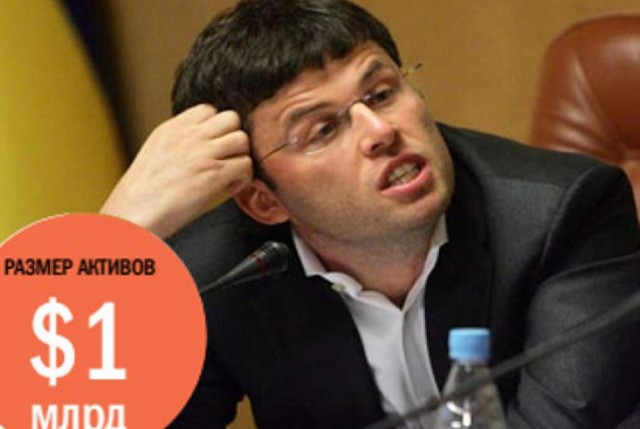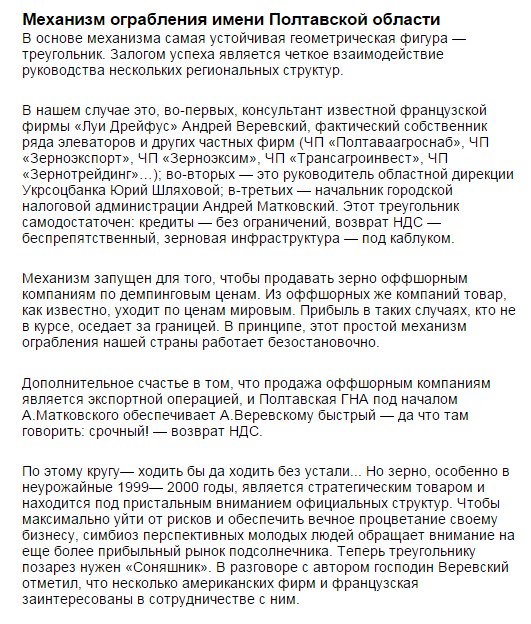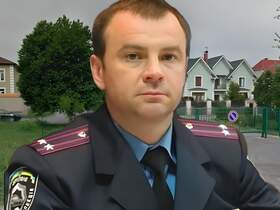Andriy Verevskyi: The success story of a former Member of the Party of Regions and BYuT

Andriy Verevskyi: The success story of a former Member of the Party of Regions and BYuT
One of the most mysterious Ukrainian oligarchs is the co-founder of Ukraine’s largest agricultural holding "Kernel" and a former member of parliament for four terms, Andriy Verevskyi.
He practically does not appear in Ukraine, managing the business from Switzerland. Having been a member of parliament for over 10 years, he managed to create a successful business, lobbying for it in the Verkhovna Rada. He was removed from his position as an MP before the start of the revolution in Ukraine. In fact, it did not affect him at all – Verevskyi continues to "make money" on the agricultural potential of our country.
"Young agrarian"
Andriy was born in 1974 in Poltava. He attempted to obtain higher education at the Poltava Engineering and Construction Institute, but it didn’t work out – he went to work. Besides, he studied at Oxford College and also graduated from the National Agrarian University in 2001. He owes his initial capital to his father, Mykhailo Verevskyi, a major entrepreneur and owner of several enterprises related to the agricultural sector. It is noteworthy that Mykhailo Ivanovych was under the protection of the leader of the Socialist Party, Oleksandr Moroz, for a long time, and was even the head of his election headquarters in the 1998 elections. These political connections greatly helped the elder Verevskyi in running the business. And it also influenced Andriy Verevskyi, as otherwise, his rapid career cannot be explained. A 19-year-old youth, who studied at the institute for only a year, was immediately appointed to a managerial position at the Poltava branch of the state company "Khlib Ukrainy" (engaged in the purchase and storage of grain under state order). He worked there for almost 5 years, simultaneously building his own business empire.
In 1998, Andriy took the position of deputy general director of the company "Zernoexport" and a year later became deputy director for commercial affairs at the enterprise "Transagroinvest". In 2002, before entering big politics, he was the chairman of the supervisory board of the "Sonyashnyk" plant, which he cunningly "squeezed out" back in 2000.
"Squeezing" of the "Sonyashnyk" plant
In May 2000, the bank "Aval" unexpectedly refused to renew the financial agreement with the "Sonyashnyk" plant and demanded repayment of the loan amounting to 5 million UAH. The plant was denied refinancing. But here, like a prince on a white horse, Andriy Verevskyi appeared with an offer to pay off the enterprise’s debts in exchange for 40% of its shares. The management, after some thought, agreed, but later it turned out that, in addition to these 40%, Verevskyi held another 11% of shares, giving him a controlling stake over the entire enterprise. A scandal arose, and Andriy had to sell the "excess" shares to the management of "Sonyashnyk". And just a few days later, the same shares were pledged to "Ukrsotsbank" to obtain a three-month loan. It is noteworthy that the amount of this loan was 9 times less than the value of the pledged shares. Seeing an opportunity to profit, the management of "Ukrsotsbank" blocked these shares, leaving their "new" owners with nothing. At the same time, Verevskyi made demands to the plant’s management: a complete change of management and gaining full control over it. Andriy appointed Viktoriya Matkovska, the wife of the then-head of the tax administration of Poltava, as the plant’s director.
At the same time (of course, purely by chance), the distribution of "Sonyashnyk" assets drew the interest of law enforcement, whose interests (again, by chance) coincided with the financial plans of Andriy. At that time, endless inspections of the plant’s activities began, the results of which were not reported to the management. Even the General Prosecutor’s Office of Ukraine intervened in the matter, with whose actions Verevskyi’s hand was clearly visible, as after each subsequent inspection, he came to the resisting managers and convinced them that unless they transfer the controlling stake to him, the prosecutor’s office would not back down. He proposed to "amicably" resolve all their problems with a single phone call. And, as we can see today, they gave in, and Andriy gained control over another enterprise.
The mechanism for robbing the Poltava region, used by Verevskyi (according to the "Dzerkalo Tyzhnya" publication):
Political turncoat
Andriy Verevskyi quickly realized that politics helps a lot in resolving business issues, and therefore in 2002 he ran for election as an independent candidate from the 146th electoral district (Poltava region). Becoming a member of parliament, Andriy went through all the party "beds", starting with Leonid Kuchma’s "Yedyna Ukraina", visited the "Regions of Ukraine", the Yuliya Tymoshenko Bloc, and ending with the "Party of Regions". The fact that the title of a member of parliament brings great benefits for business, Verevskyi felt during the financial crisis in 2008, when the parliament, headed by Yuliya Tymoshenko, introduced quotas on butter export. Despite the prohibitions, Verevskyi’s firms continued to export their products, and even increased volumes. Competitors in this situation were left with nothing but to bite their elbows.
Alongside his political career, Andriy Verevskyi’s business was also developing. In 2004, consolidating all his assets, he created Kernel Holdings S.A., which included elevators, grain terminals, oil extraction plants, and bread factories. Every year, the "Kernel" company became stronger, and its profits grew rapidly. Over time, it became the leader in the Ukrainian sunflower oil market (brands "Chumak", "Shchedry Dar", "Stozhar").
One of the few public appearances of Andriy Verevskyi:
Over time, Andriy realized that power in the country would soon change, and he left the Yuliya Tymoshenko Bloc, joining the "Party of Regions". And just in time, as when they came to power, they also introduced quotas on the sale of grain abroad. Verevskyi’s swift decision to "change political views" gave him the opportunity to work "outside" these quotas.
Expelled from Parliament "for Absenteeism"
In the spring of 2013, the Higher Administrative Court ruled to revoke his parliamentary mandate, thereby satisfying the lawsuit of the then parliament speaker Volodymyr Rybak. According to the official version, Andriy Verevskyi violated the law "On the Status of a People’s Deputy", combining committee work on land issues with a managerial position at the "Kernel" holding. It is assumed that he used the elective position for his own interests. According to an unofficial version, the regionals were demonstratively trying to strengthen discipline within their ranks, so that faction members would not skip sessions (Verevskyi was the most notorious absentee, as he practically lived in Switzerland, managing his business from there). In fact, Andriy wanted to expand his business by taking a loan in Europe. The trouble was that Ukrainian politicians are not very trusted there, checking practically every dollar they receive or give. In fact, he was faced with a choice: either give up the mandate and receive a loan, or remain an MP but not get the required loan. For him, as a businessman-politician, not a politician-businessman, the choice was obvious.
During the four convocations in which he was elected as a member of parliament, he managed to take control of practically all elevators in the Poltava region. Essentially, he became Ukraine’s "grain" monopolist, as only he had the right to store grain, he owned the right to priority shipment and its free storage. To all this should be added the ability to obtain any bank loan secured by the elevators he owned, as well as friendships with regional leaders and the management of "Ukrsotsbank".
Source: skelet-info
Topics: Andriy VerevskyiLeonid KuchmaParty of RegionsVolodymyr RybakYuliya TymoshenkoKernelSonyashnyk plant

Comments:
comments powered by DisqusЗагрузка...
Our polls
Show Poll results
Show all polls on the website












